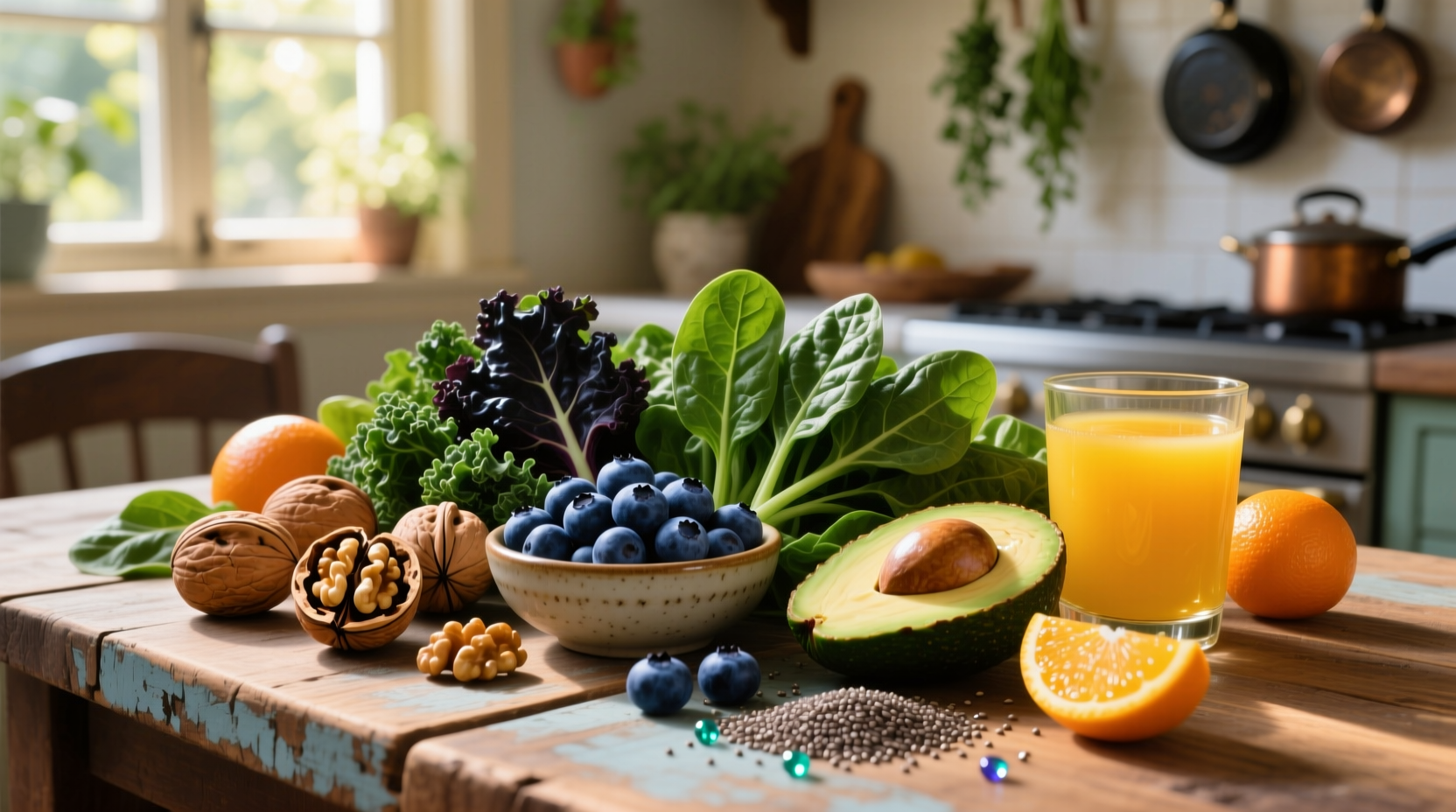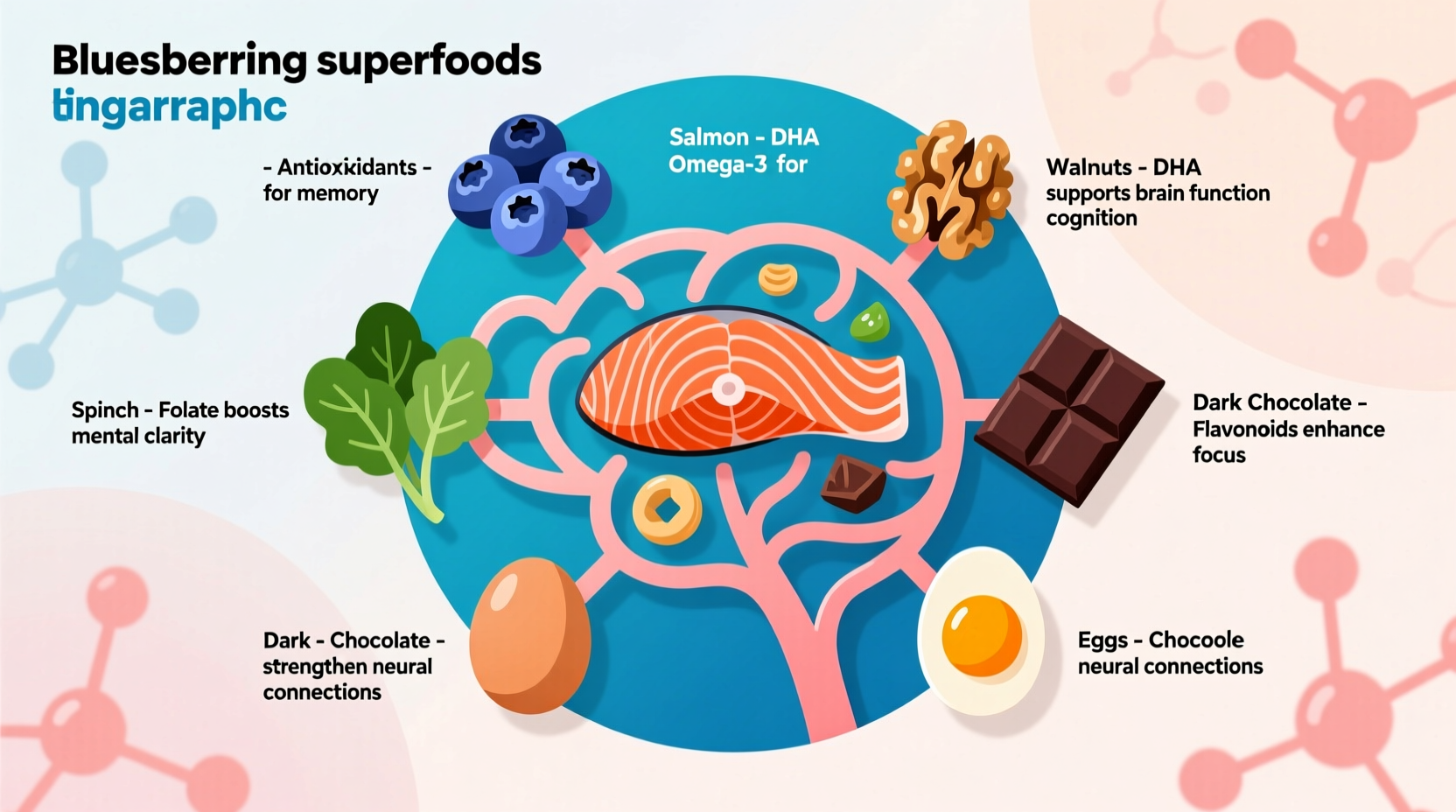Based on extensive research from Harvard Medical School, Mayo Clinic, and the National Institutes of Health, the top brain-boosting foods include fatty fish rich in omega-3s (like salmon), dark leafy greens (kale, spinach), berries (especially blueberries), nuts (particularly walnuts), and turmeric. These foods enhance cognitive function through antioxidant protection, reduced inflammation, and improved blood flow to the brain.
Imagine waking up each morning with sharper focus, better memory recall, and sustained mental energy throughout your day. The secret might be on your plate. Scientific research consistently shows that certain foods directly impact brain health, protecting against cognitive decline while enhancing daily mental performance. This isn't about quick fixes or miracle supplements—it's about making informed dietary choices backed by decades of neurological research.
Why Your Brain Needs Special Nutrition
Your brain consumes about 20% of your body's energy despite representing only 2% of your weight. This energy-intensive organ requires specific nutrients to maintain neural connections, protect against oxidative stress, and support the production of neurotransmitters. Unlike other organs, the brain can't store energy reserves, making consistent nutrient intake crucial for optimal function.
| Nutrient | Brain Function | Primary Food Sources |
|---|---|---|
| Omega-3 Fatty Acids | Builds brain cell membranes, reduces inflammation | Fatty fish, walnuts, flaxseeds |
| Antioxidants | Protects against oxidative stress and inflammation | Berries, dark chocolate, pecans |
| B Vitamins | Supports neurotransmitter production, homocysteine regulation | Leafy greens, eggs, legumes |
| Vitamin E | Protects cell membranes from damage | Almonds, sunflower seeds, avocados |
Top 7 Brain-Boosting Foods With Scientific Backing
1. Fatty Fish: The Omega-3 Powerhouse
Fatty fish like salmon, mackerel, and sardines contain high levels of docosahexaenoic acid (DHA), an omega-3 fatty acid that constitutes about 30% of the brain's structural fat. According to a National Institutes of Health study, regular consumption of fatty fish correlates with larger brain volume and reduced risk of cognitive decline. Aim for two 3.5-ounce servings per week to maintain optimal brain health.
2. Berries: Nature's Antioxidant Arsenal
Blueberries, strawberries, and blackberries contain anthocyanins and other flavonoids that cross the blood-brain barrier to reduce inflammation and improve communication between brain cells. Research published in the Journal of Agricultural and Food Chemistry demonstrated that older adults who consumed blueberry juice daily showed significant improvements in memory and learning functions within 12 weeks.
3. Leafy Green Vegetables: The Cognitive Shield
Kale, spinach, and Swiss chard provide high concentrations of vitamin K, lutein, folate, and beta-carotene. A landmark study from Rush University followed 960 older adults for five years and found that those consuming one to two servings of leafy greens daily had the cognitive ability of people 11 years younger than those who rarely ate them. These vegetables support brain health through multiple protective mechanisms working in synergy.

4. Nuts and Seeds: The Healthy Fat Source
Walnuts, almonds, and sunflower seeds deliver essential fats, vitamin E, and other nutrients that protect brain cells. Walnuts specifically contain alpha-linolenic acid (ALA), a plant-based omega-3 that complements the DHA found in fish. A 2019 study in the American Heart Association journal linked higher nut consumption with better cognitive performance in older adults, particularly in processing speed and executive function.
5. Turmeric: The Golden Spice for Brain Health
Curcumin, the active compound in turmeric, crosses the blood-brain barrier and has potent anti-inflammatory and antioxidant benefits. Research from UCLA showed that curcumin supplementation improved memory and attention in healthy adults over 18 months. For maximum absorption, combine turmeric with black pepper (which contains piperine) and a healthy fat like olive oil.
6. Whole Grains: The Steady Energy Provider
Whole grains like oats, quinoa, and brown rice provide steady glucose release—the brain's primary energy source. Unlike refined carbohydrates that cause blood sugar spikes and crashes, whole grains maintain consistent energy levels crucial for sustained concentration. The American Heart Association notes that diets rich in whole grains correlate with better cognitive function in aging populations due to improved blood flow and reduced inflammation.
7. Coffee and Tea: The Cognitive Enhancers
Moderate coffee consumption (3-4 cups daily) provides caffeine and antioxidants that enhance alertness and protect against neurodegenerative diseases. Green tea contains L-theanine, which works synergistically with caffeine to improve attention without the jitters. A meta-analysis in Frontiers in Aging Neuroscience found that regular coffee drinkers had a significantly lower risk of developing Alzheimer's disease compared to non-coffee drinkers.
Practical Implementation: Building Your Brain-Healthy Plate
Knowing which foods help your brain is only half the battle—you need practical strategies to incorporate them consistently. Start with these simple, evidence-based approaches:
- Breakfast boost: Add walnuts and blueberries to your morning oatmeal
- Lunch transformation: Replace lettuce with spinach or kale in salads
- Smart snacking: Keep a container of mixed nuts and dried berries at your desk
- Dinner upgrade: Swap white rice for quinoa and include fatty fish twice weekly
- Flavor enhancement: Add turmeric to soups, stews, and smoothies
Realistic Expectations: What These Foods Can and Cannot Do
While brain-healthy foods provide significant cognitive benefits, it's crucial to understand their limitations. No single food can prevent Alzheimer's disease or dramatically reverse existing cognitive decline. The Mediterranean-DASH Intervention for Neurodegenerative Delay (MIND) diet, specifically designed for brain health, shows that consistent dietary patterns over years—not quick fixes—yield the most significant protection.
Research indicates that dietary changes typically require 6-12 months to show measurable cognitive improvements. Additionally, brain health depends on multiple factors beyond diet, including quality sleep, regular exercise, mental stimulation, and social engagement. The most effective approach combines brain-healthy eating with these other lifestyle factors.
Common Misconceptions About Brain-Boosting Foods
Several myths persist about brain-healthy eating that deserve clarification:
- Myth: Supplements can replace whole foods for brain health
Reality: While supplements may help in specific deficiencies, whole foods provide complex nutrient combinations that work synergistically—something supplements cannot replicate - Myth: Only older adults need to worry about brain-healthy eating
Reality: Brain health is cumulative—dietary habits in your 30s and 40s significantly impact cognitive function decades later - Myth: More is always better
Reality: Excessive consumption of even healthy foods can cause problems—balance and variety remain essential
Your Brain-Healthy Eating Journey Starts Today
Building a brain-healthy diet doesn't require drastic changes. Start with one or two simple swaps this week—add berries to your breakfast or replace your afternoon snack with a handful of walnuts. As these small changes become habits, gradually incorporate more brain-boosting foods into your routine. Remember that consistency over time creates the most significant impact on your cognitive health. Your future self will thank you for the investment you make today in nourishing your most important organ.











 浙公网安备
33010002000092号
浙公网安备
33010002000092号 浙B2-20120091-4
浙B2-20120091-4